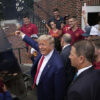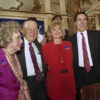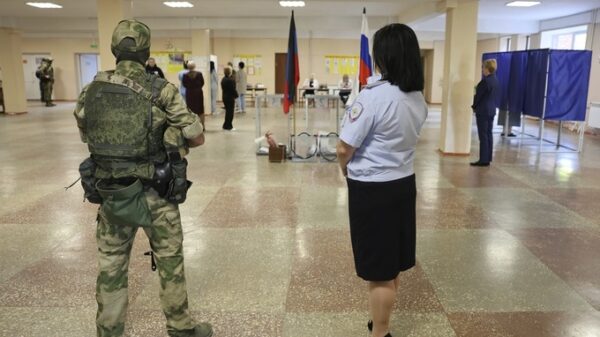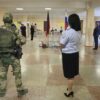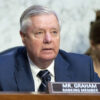People line up to cast their ballot for Gambia’s presidential elections in Bakau, Gambia, Saturday, Dec. 4, 2021. Gambians vote in a historic election that will for the first time not have former dictator Yahya Jammeh, who ruled for 22 years, on the ballot. (AP Photo/Leo Correa)
BANJUL, Gambia (AP) — Lines of voters snaked around corners outside polling stations in Gambia’s capital Saturday as the nation holds a presidential election that for the first time in decades does not include former dictator Yahya Jammeh as a candidate.
Polls opened to high turnout, with many people lining up at the capital’s Independence Stadium before sunrise. Nearly 1 million voters were expected to drop marbles into one of six ballot bins, each adorned with the face and name of a candidate.
They include incumbent President Adama Barrow, who defeated Jammeh in 2016 while running as the candidate for an opposition coalition.
Barrow’s challengers are former mentor and head opposition leader Ousainou Darboe of the United Democratic Party; Mama Kandeh of Gambia Democratic Congress; Halifa Sallah of People’s Democratic Organization for Independence and Socialism; Abdoulie Ebrima Jammeh of the National Unity Party; and Essa Mbye Faal, former lead counsel of Gambia’s truth commission, who is running under an independent ticket.
They have all vowed to run under an agenda for change and a stronger economy in the aftermath of the coronavirus pandemic so fewer Gambians feel compelled to travel the dangerous migration route to Europe.
While the 2016 election that removed Jammeh from power after 22 years saw Gambians go from fear to elation, many are still not satisfied with the progress the nation has made. They want certainty that the new leaders will bring the tiny West African nation of about 2 million toward peace and justice.
Despite the nation continues to suffer from the effects of his rule, including rights abuses and funds taken from state coffers.
“As a country, we cannot heal without justice. We cannot have reconciliation without justice,” Gambia Bar Association lawyer Salieu Taal told The Associated Press.
Jammeh left Gambia in 2017. His two-decade rule was marked by arbitrary arrests, enforced disappearances and summary executions that were revealed through dramatic testimony during Truth, Reconciliation and Reparations Commission hearings that lasted for years.
Last week, the commission handed its 17-volume report to President Barrow, urging him to deliver on expectations in ensuring that perpetrators of human rights violations are prosecuted.
“I assure them (victims’ families) that my government will ensure that is justice is done, but I urge them to be patient and allow the legal process to take its course,” Barrow told commissioners upon receiving their final report.
Still, Barrow reelection is uncertain as many Gambians feel betrayal after his National People’s Party reached a deal with the top figures of the former ruling party.
Ndey Sambou, a trader at Brikama market, told The Associated Press that the president should clear the air over the content of the memorandum of understanding signed between his party and the Alliance for Patriotic Reorientation and Construction (APRC), which ultimately split with Jammeh.
Sainey Senghore who survived gunshot wounds during an April 2000 crackdown on peaceful students demanding justice for a rape victim made it clear that victims’ expectations will be forefront as they head to the polls Saturday.
“This government came to place with a lot of promises. At the end, they are sidelining the victims, working in line with the perpetrators,” he said, calling Barrow’s rapprochement with APRC “very disheartening, and very disappointing.”
Similar sentiments were echoed by Abdoulie H. Bojang, whose son was killed during the violent crackdown on student protesters.
“We need justice to be able to have closure in this ongoing tragedy,” he said.
The links to Jammeh are not only an issue for the current president, however. Opposition candidate Kandeh has been supported strongly by a breakaway political faction that Jammeh formed during his exile in Equatorial Guinea.
While Kandeh has maintained silence about Jammeh’s possible return to Gambia, his allies are unequivocally saying that Jammeh would come back if they emerge victorious from the election.
Jammeh, who seized power in 1994 in a bloodless coup, was voted out of office in 2016. After initially agreeing to step down, Jammeh resisted, and a six-week crisis saw neighboring West African countries prepare to send in troops to stage a military intervention. Jammeh was forced into exile and fled to Equatorial Guinea.
Of the other candidates, Sallah and Darboe are established politicians, but they face challenges from newcomers such as Faal and Ebrima Jammeh, who are making waves in urban areas.
Gambians, used to violence surrounding polls, worry about a possible confrontation between Barrow and Darboe supporters, as the years have seen a great divide between the two leaders who were once close.
Petesch reported from Dakar, Senegal.
Copyright 2021 Associated Press. All rights reserved.



































